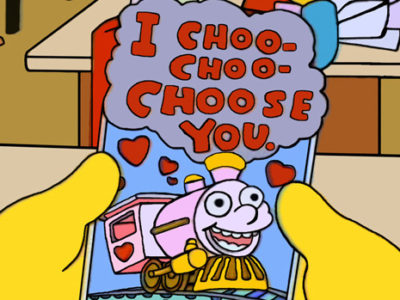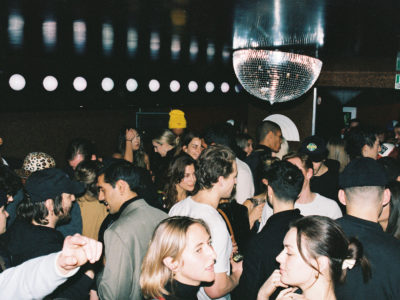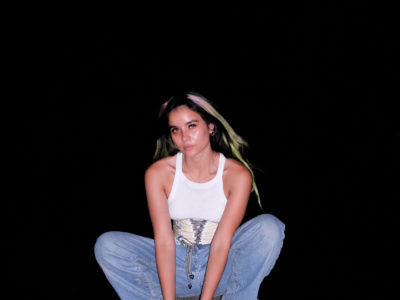
VÉRITÉ Doesn’t Play by the Rules
VÉRITÉ Doesn’t Play by the Rules
WORDS BY: ARIELA KOZIN | PHOTOS BY LINNEA STEPHANS
VÉRITÉ’s debut album Somewhere in Between is pop, but it’s not quite like the pop music we’d expect. As you can guess from the album’s title, her music isn’t at all bubblegum or pristine. The artist (born Kelsey Byrne) leaves her sound raspy and raw to the elements. That sort of unpolished tenor— a rarity in the manufactured pop world of today— is especially helpful on an album all about uninhibited emotions.
The instrumentals also play well with her voice. While she’s jumping from note to note, synths and percussion layer one on top of the other into a tightly woven, yet complex orchestra. Her range, her writing ability and her production’s creativity are no more clear than on “Better.” Keys scat for the first few seconds before she reflects on an old, disappointing lover: “Fixed and false / Captivating / Crazy/ Don’t come over lately / Apologies for days and days.” Like we all can most likely relate, she moves on to question where to place blame: “Maybe I fucked it up? / Maybe I left you down?” We think we know where the narrative is going—another story about yearning—until it transforms into a self-proclamation where a booming bass drops and her tone turns fierce: “Maybe we’re just better off.”
The first single, “Phase Me Out,” is a great representation of the compilation’s overarching theme—her vocals spiral like the fluctuations that come with the uncertainty of the messy parts of life, the grey areas that can’t be defined and that we have no control over. With Somewhere in Between, the New York native doesn’t knock on the door with these thirteen tracks, she smashes it down—and she won’t be making any apologies for herself either. This album, out June 23, is VÉRITÉ. Take her or leave her.
On the Business of VÉRITÉ
Musicians today can be just as much an entrepreneur as any Silicon Valley tech founder. They are their brand and each creative decision must be melded with public demand in order to be a success. The life of a musician needs to seem glamorous, but behind the scenes are grueling hours creating, months away from home, and keeping up enough confidence to tackle haters. And like many who don’t win success via nepotism, they start with nothing but a dream and an insatiable hunger to be the best at what they do.
VÉRITÉ is one of those artists we’d consider to be an entrepreneur. Her career got its first big boost back in 2014 when she saved up enough money working at Applebee’s to self-release her first single, “Strange Enough.” After tireless hours cold emailing blogs, her debut reached #1 on Hype Machine and she was crowned Twitter’s #1 Viral Artist all within a week of its premiere. Fast forward a few years and the one-woman act is just fresh off her tour with Betty Who and already selling out her first solo tour before her debut album.
We were lucky enough to sit down with the rising star to talk about her beginnings, what drives her, and the ever-changing music business:
How did you end up working at Applebee’s?
I graduated from college and I worked full time through college. Then I moved to New York because it felt like it was a next step and I got a job. I worked at Applebee’s upstate so I transferred. And then I worked like I’ve always worked, which is a lot. I worked 50-70 hours a week when it was busy and just saved money. My family has raised me to be like a machine. We’re all just super intense hard workers.
The narrative in my mind was, “I’m going to work, I’m going to make as much money as I can and I’m going to save it. Why? I don’t know yet.” And in these cracks of time, I would write because that’s what I went to college for. I love writing music, and I just have a very compartmentalized mind. Eventually, I made this group of music that I was excited about and I released one song on YouTube as a video. I spent like $750, which was like way too much money and was feeling so guilty because of it. I think it maxed out at like 500 views and I said to myself, “This is not enough. I put $750 into this video, more people are gonna listen to it!”
I emailed every blog I could find, like 300 blogs, and one called SelfBlown finally responded. They posted that video to their site and it spiraled into a lot of emails from major labels. They wanted to fly me out to London and I ended up taking three meeting a day for a month. I also met my manager, Vanessa Magos, around that time and we decided to not sign and take down the video. Then we kind of planned a more steady release. I released “Strange Enough” and my first EP, and then kind of moved on from there.
Can you describe the moment when you decided you’d pursue a career in music?
I don’t remember the exact moment, but it was in this time period where I had a group of songs, that wound up being on my first EP. They were the first songs that I knew I wanted to release and I made the decision to invest my savings in it. I think it was like $2,000 and that to me was a massive deal just because I had nothing back then. I wasn’t going lose that money so I went all in.
Do you see a hole in pop music that you believe your music fills?
Definitely. I think my goal has always been to create a lane for myself and I’ve seen a lot of female artists do the same. I think Florence and the Machine, Banks, and Lorde are great examples of strong bad ass women who have risen to the top of their genres in a way that is very unique. And I think for me, my goal is to do that.
I think my goal has always been to create a lane for myself and I’ve seen a lot of female artists do the same.
How do you think your recent tour with Betty Who prepared you for your first headline tour later this year?
Following a bus in a van is a lot of driving, so if anything, the headline tour will be a slightly easier.Betty Who and I also don’t have the same fans necessarily so it was a great process of introducing myself to a group that probably hasn’t heard of me or really listened to a lot of my music. That’s my favorite kind of tour to do because you get to interact with new people and kind of bring them into your world and hopefully keep them there.
We stalked your Twitter a little bit. Once you tweeted, “Let’s be straight, I’m always a little bit paranoid people won’t show up to my shows.” Where does that fear come from?
It’s funny. I used to play music with my cousin and he responded to that tweet by writing, “That deep-seated paranoia comes from all of the years that we played open mics to no one.” I started playing shows in New York when I was 16 and I literally walked down Bleecker Street with a CD and gave it to clubs and was like, “Can I play your venue?” And so I played a lot of shows to no one which is just what you do in seedless clubs on Bleecker Street. I think there’s always just that thought in my mind and that memory, and I’m always kind of pleasantly surprised. I keep my expectations low and I’m happy when people show up—even when the show is sold out.
What do you do to combat all the negative voices?
Our pre-show ritual is literally telling each other to “fuck off” and doing burpees and just getting super aggressive. And if we don’t do burpees before the show, then we don’t have a good show. My burpees are way slower cause I get the push-up form right, I’m trying to build my upper body strength, but the guys do them really quick.
To switch gears a bit, we wanted to talk about your decision to stay unsigned. It seems like there’s a steady climb right now of artists who are choosing not to sign with a label, why do you think that is?
Because it’s more possible now to build a successful career without one. I think in the past, labels were the only gatekeepers to success because they had access to distribution and I think now with Spotify, Apple Music, TuneCore, all of these companies that are geared towards helping people get their music out there in different ways. It’s possible as an independent artist to have 100 million streams on Spotify whereas that just wasn’t the case before. And I think also, financially, if you’re unsigned, that Spotify money comes back to you, you can then reinvest it, so there’s a whole financial structure that exists outside of major labels. Now there are just new gatekeepers.
It’s possible as an independent artist to have 100 million streams on Spotify whereas that just wasn’t the case before.
Besides the business side of it, is there a reason, in creative terms, to stay unsigned?
I just made an album with no A&Rs, nobody telling me what to do. I’m partnered with Kobalt who are distributing the record and I work with them internationally, and I sent them demos just to get feedback from my teammates. It’s also that I get to put out music when I want. obviously , we release it strategically, but there’s never a point where I have an album sitting. I never have to worry about a label saying, “We can’t put this out.we can’t fit it into our timeline, or we don’t think there’s a radio single, or we think you need to go back and write.”









